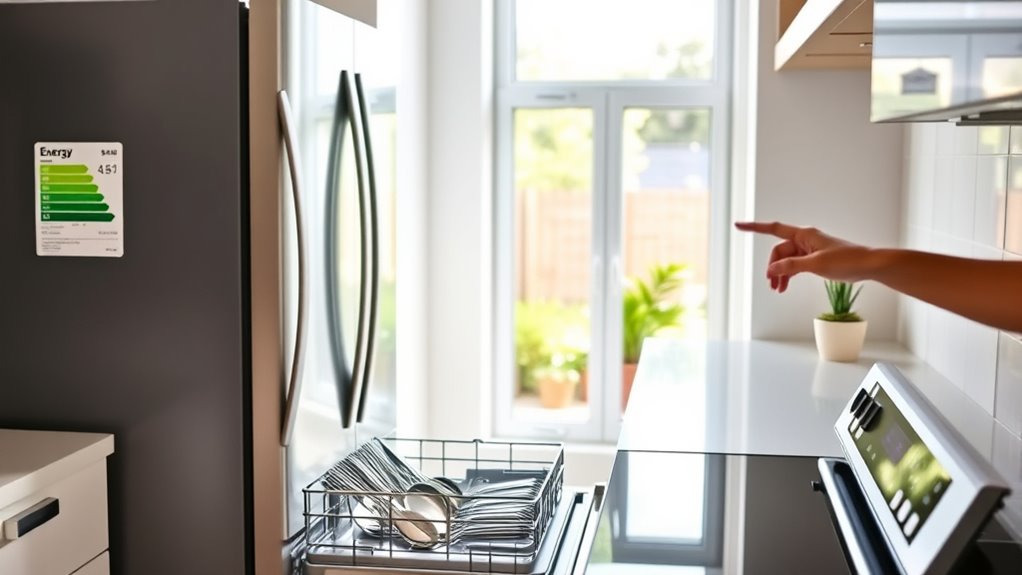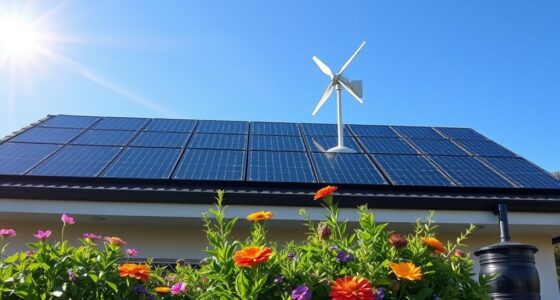To choose an energy-efficient appliance, start by looking for Energy Star labels, which indicate lower energy use. Measure your space to select the right size, avoiding waste. Consider features like smart technology or auto-adjustments for better efficiency. Evaluate both the initial cost and long-term savings, exploring any available incentives or rebates. Don't forget to factor in the environmental benefits of your choices, which can lead to healthier living. There's more you can discover about optimizing your energy use.
Key Takeaways
- Look for Energy Star and EnergyGuide labels to identify efficient appliances and compare their energy consumption in kWh.
- Choose the right size for your household to avoid energy waste and ensure optimal appliance operation.
- Consider long-term savings and potential rebates or tax credits when evaluating upfront costs of energy-efficient appliances.
- Utilize smart features and mobile apps for remote monitoring and scheduling to maximize efficiency and manage energy consumption.
- Prioritize appliances that improve indoor air quality and reduce emissions, contributing to a healthier living environment.
Understanding Energy Efficiency Labels
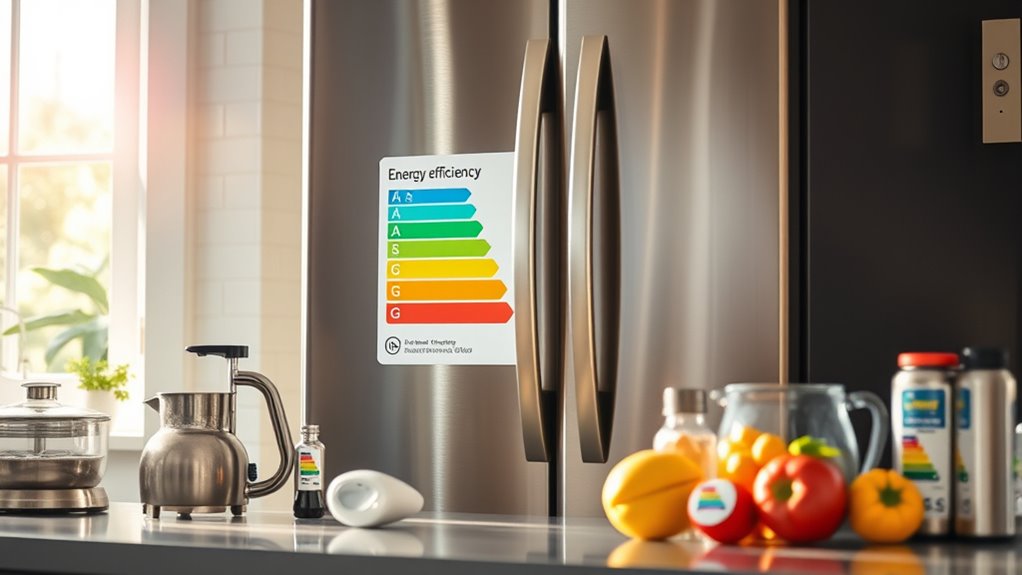
How can you make smarter choices when shopping for appliances? Start by understanding energy efficiency labels.
These labels, like Energy Star and EnergyGuide, provide crucial information about energy consumption, helping you make informed decisions. EnergyGuide labels show energy use in kWh, allowing for easy comparisons between similar appliances. Many frost-free freezers use fans to circulate air, which can help improve energy efficiency by preventing frost buildup, and understanding the refrigeration cycle can further enhance your knowledge of how these appliances operate. Additionally, products with the Energy Star label are known for their reliability and efficiency, making them a smart investment in the long run. Choosing products that meet efficiency standards ensures that you are opting for appliances that minimize energy usage without compromising performance.
The Energy Star label highlights products that meet strict efficiency standards set by the U.S. EPA, ensuring you choose the best options. When you read these labels, look for estimated yearly operating costs, which can guide you in estimating future expenses. Additionally, choosing energy-efficient appliances can significantly lower your overall energy consumption.
Choosing the Right Appliance Size
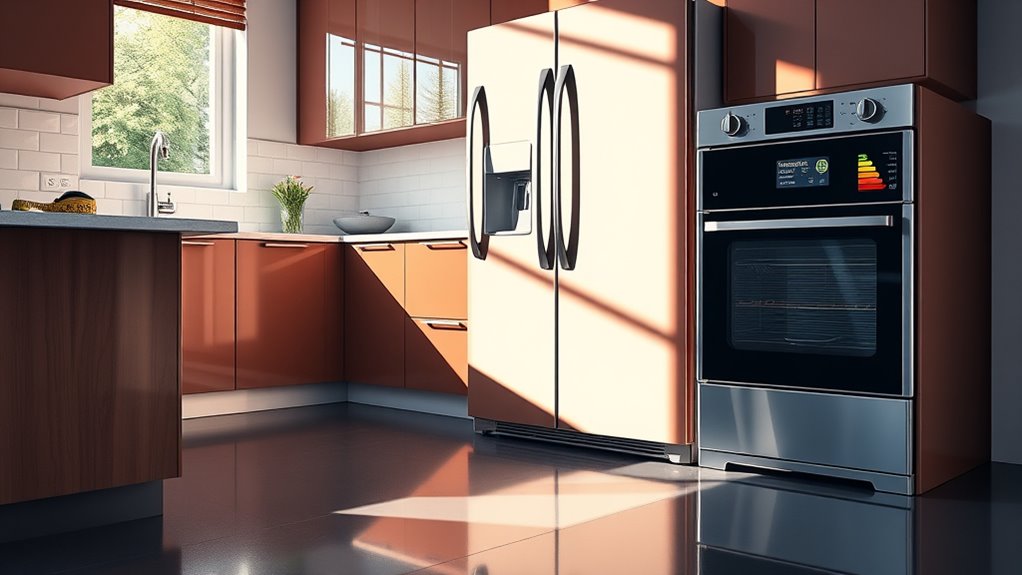
Selecting the right appliance size can significantly impact your energy consumption and overall efficiency. If you choose an appliance that's too large, you'll likely waste energy due to unnecessary power usage.
Start by measuring your available space to ensure a snug fit that allows for optimal operation. Consider your household's size and needs—larger families may require bigger appliances, but smaller households can benefit from compact options. Regular maintenance, such as filter replacement, is essential to keep appliances running efficiently, particularly for those that utilize air purification. Additionally, heat pumps can provide both heating and cooling, ensuring year-round efficiency and comfort. Proper sizing of heat pump systems is crucial for maximizing their performance and energy efficiency. An appropriately sized heat pump can enhance its Coefficient of Performance (COP), ensuring that you get the most out of your energy use.
For HVAC systems, think about your home's square footage and insulation quality to prevent energy efficiency loss. Additionally, retrofitting homes for heat pumps can enhance overall system efficiency and ensure you are using your appliances effectively.
Ultimately, selecting appropriately sized appliances not only conserves resources but also leads to long-term savings, helping you reduce your carbon footprint and support sustainability efforts.
Investigating Energy-Efficient Features
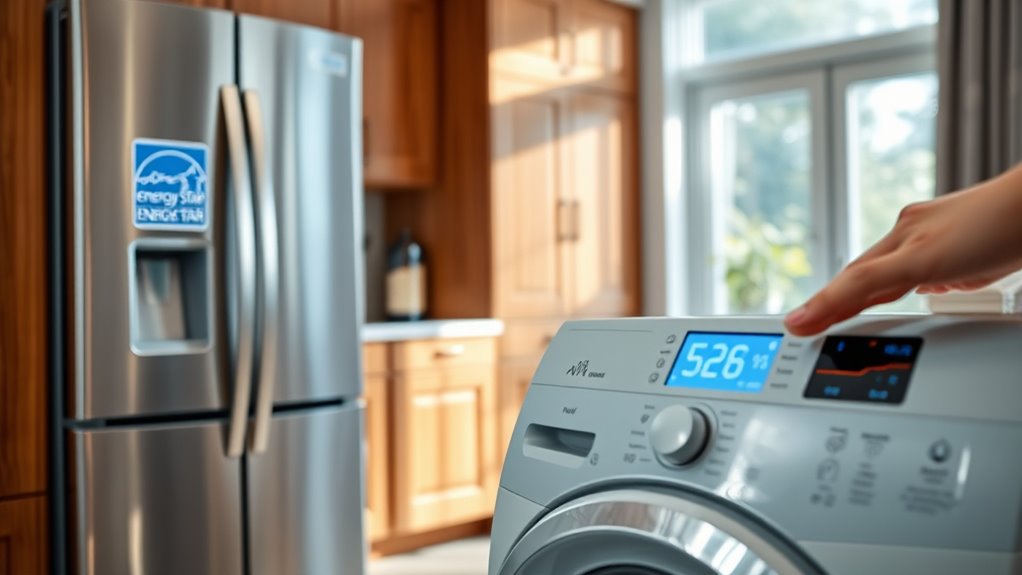
Once you've chosen the right appliance size, it's time to explore energy-efficient features that can enhance your home's efficiency.
Look for smart appliances that offer remote control and monitoring through mobile apps, making it easier to manage energy use. Features like open door alerts on refrigerators can prevent energy waste, while dryers that adjust cycle times based on load size save power. Heat pumps can also be an efficient alternative for heating and cooling, further reducing energy consumption. Additionally, geothermal heat pumps can achieve efficiency ratings of 300% to 600%, significantly outperforming traditional HVAC systems. Moreover, the use of commercial grade heat pumps in residential settings can bring added efficiency benefits due to their advanced technology and performance capabilities. Burning only dry, seasoned wood in wood stoves can improve combustion efficiency and contribute to a greener home environment.
Inverter technology helps appliances meet demand without excess energy consumption. Additionally, appliances with ENERGY STAR certification ensure they meet strict efficiency standards. Implementing heat pump technology can further improve overall energy efficiency in your home.
Evaluating Lifetime Costs and Savings
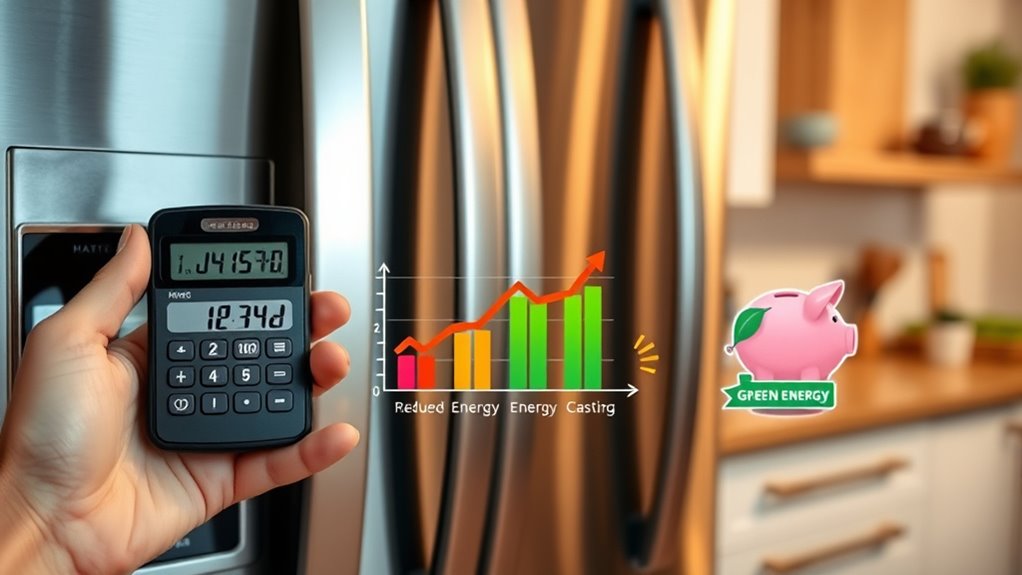
When you're evaluating lifetime costs and savings for energy-efficient appliances, it's crucial to consider both the initial investment and the long-term benefits.
While these appliances may have higher upfront costs, they typically offer lower operating expenses due to reduced energy consumption. Check for government rebates or incentives that can help offset that initial expense. Additionally, choosing appliances with HEPA filters can provide significant health benefits while also improving energy efficiency. Notably, energy efficiency ratings can help guide your choices by offering benchmarks for comparison among different models. The integration of smart home devices can further enhance efficiency by allowing for better monitoring and control of energy usage. Furthermore, utilizing battery-less solar inverters can complement energy-efficient appliances by ensuring immediate energy use without the need for storage.
Use EnergyGuide labels to compare estimated annual operating costs among different models, and calculate the break-even point to see how long it takes for savings to cover the cost difference.
Factor in local energy prices and usage patterns, as these can significantly influence your overall savings. Ultimately, energy-efficient appliances can lead to substantial long-term savings and a reduced carbon footprint. Additionally, understanding savings goals can enhance your financial planning when investing in such appliances.
Smart Usage Practices
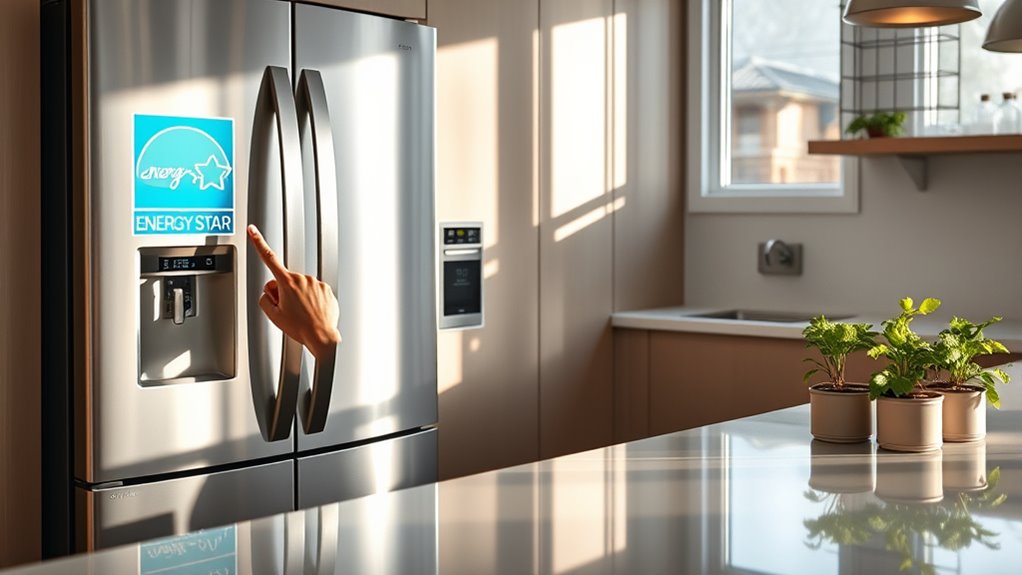
To maximize the benefits of energy-efficient appliances, you can adopt smart usage practices that enhance efficiency and reduce costs.
Start by using mobile apps to remotely control your appliances, making adjustments even when you're not home. Take advantage of energy monitoring features to track your consumption and identify savings opportunities. Additionally, consider appliances with Energy Star ratings to ensure you are choosing high-efficiency options. Integrating smart utilities into your home can further enhance your energy efficiency.
Use mobile apps to control appliances remotely and monitor energy consumption for potential savings.
Schedule appliance operations during off-peak energy rates to cut costs further. Leverage auto-adjustment features that optimize settings automatically based on your usage patterns.
Integrating your appliances into a smart home system allows for seamless energy management. Utilize voice commands for easy access and set alerts for maintenance needs or issues like an open refrigerator door. Additionally, consider using appliances with smart capabilities to further streamline your energy management efforts.
These practices help you make the most of your energy-efficient appliances.
Environmental Considerations
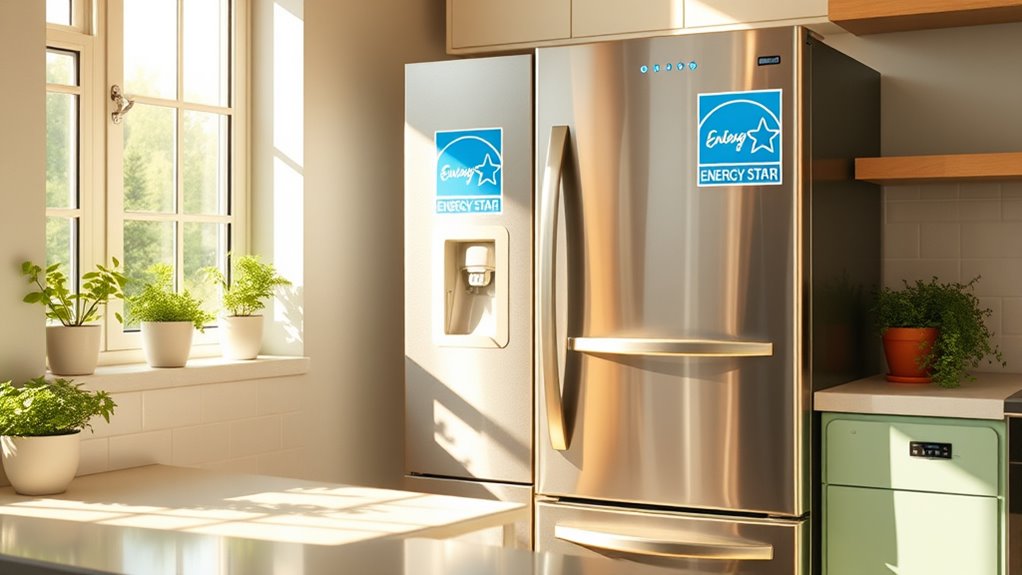
Energy-efficient appliances play a vital role in reducing environmental impact while offering significant benefits to households. By consuming less energy, you lower your carbon footprint and decrease the demand for electricity generated from fossil fuels. Proper venting techniques are also essential for maximizing the efficiency of appliances that require combustion, ensuring safety and optimal performance. Additionally, choosing sustainable living practices can enhance the overall effectiveness of these appliances and contribute to a greener lifestyle. Furthermore, implementing the art of decluttering can help create a more organized space, allowing you to fully appreciate your energy-efficient appliances.
Since appliances account for about 39% of global energy-related CO₂ emissions, upgrading to efficient models is crucial for combating climate change. Modern appliances also conserve water, reducing the energy needed for treatment and pumping. Furthermore, promoting biodiversity hotspots can help mitigate the effects of climate change and support ecosystem health.
Plus, they help improve indoor air quality by minimizing harmful gas emissions. By investing in energy-efficient options, you support sustainable development and signal manufacturers to innovate further in sustainability. Additionally, using energy-efficient appliances can complement the transition to hydrogen fuel cells, which are seen as a key player in clean energy solutions.
Exploring Incentives and Rebates
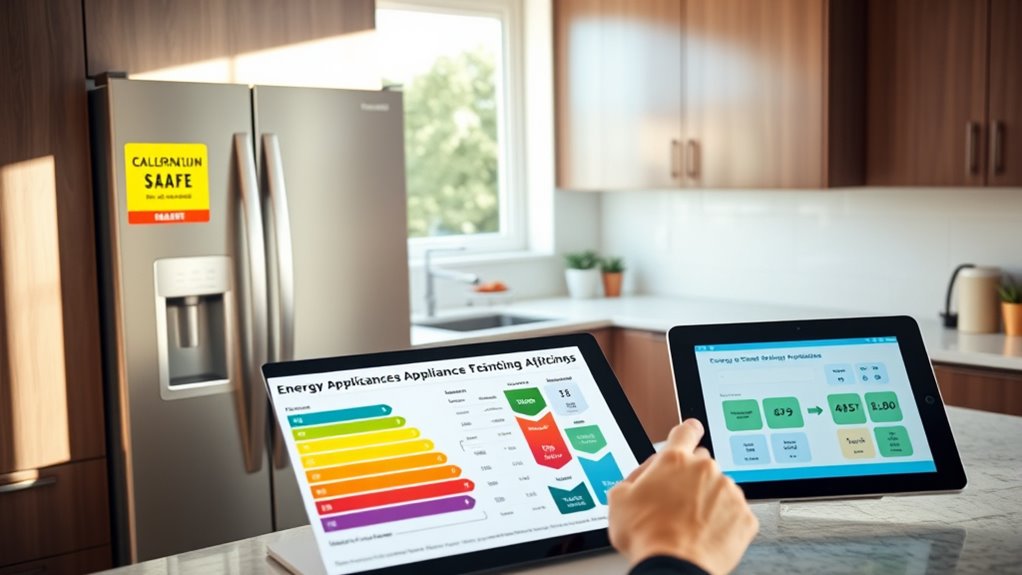
How can you make the most of your investment in energy-efficient appliances? Start by exploring rebate programs available in your area. When you purchase ENERGY STAR certified appliances, you could earn rebates from providers like Consumers Energy.
Look for instant rebates at retailers like The Home Depot and Lowe's—these savings come without the hassle of paperwork. Additionally, don't overlook federal tax credits, which can cover up to 30% of your costs for energy-efficient upgrades. Investing in energy-efficient appliances can be seen as a way to diversify your portfolio, similar to how Bitcoin is considered a leading digital currency for investment.
Check state-specific incentives, as they often vary. For more information, use online resources like ENERGY STAR to find rebates tailored to your location. Taking advantage of these programs can significantly lower your upfront costs while supporting your energy efficiency goals. Moreover, understanding tax implications of inherited IRAs can help you make smarter financial decisions regarding your overall investments.
Frequently Asked Questions
How Can I Recycle My Old Appliances Responsibly?
You can recycle your old appliances responsibly by evaluating their condition first.
If they're still functional, consider donating or selling them. For those that aren't, check for local drop-off programs or specialized recycling services.
Make sure to remove hazardous materials and clean the appliances before disposal.
You might also want to participate in community collection events or manufacturer take-back programs to ensure proper recycling and reduce your environmental impact.
What Are the Best Brands for Energy-Efficient Appliances?
Did you know that energy-efficient appliances can save you up to $500 a year on utility bills?
When you're looking for the best brands, Frigidaire and Maytag stand out for their reliable Energy Star-certified models.
KitchenAid offers innovative cooking solutions, while Whirlpool excels in smart ovens.
Don't forget about LG, which combines space-saving design with advanced features.
Choosing any of these brands means you're investing in efficiency and sustainability for your home.
How Do Energy-Efficient Appliances Perform Compared to Standard Ones?
Energy-efficient appliances generally outperform standard ones in several ways. They use less energy while still delivering excellent performance, which means you can enjoy lower utility bills over time.
You'll find that many energy-efficient models come with advanced features, like smart technology and better insulation. Plus, they often operate more quietly and produce fewer emissions, contributing to a healthier environment.
Are There Energy-Efficient Options for Every Type of Appliance?
You might be surprised to find that energy-efficient options exist for nearly every appliance you use daily.
From refrigerators to dishwashers, and even ranges, manufacturers have designed models that save energy and reduce utility bills.
You'll discover that modern microwaves and countertop appliances also offer significant energy savings.
How Can I Tell if an Appliance Is Truly Energy-Efficient?
To tell if an appliance's truly energy-efficient, start by checking for the ENERGY STAR label, which indicates it meets high efficiency standards.
Look for the Energy Guide label, giving you estimated annual energy costs.
Comparing models using CEE tiers helps too; Tier 1 is as efficient as ENERGY STAR.
Lastly, consider the appliance's age—newer models generally use less energy.
These steps will guide you toward making a smart choice for your energy needs.
Conclusion
In your quest for energy-efficient appliances, remember that every choice you make is a step toward a greener future. By understanding labels, sizing up your needs, and exploring smart features, you're not just saving money—you're planting seeds for a sustainable world. Embrace these practices, and watch your energy bills shrink like ice on a summer day. With a little effort, you can turn your home into an eco-friendly haven, reaping rewards for both your wallet and the planet.
